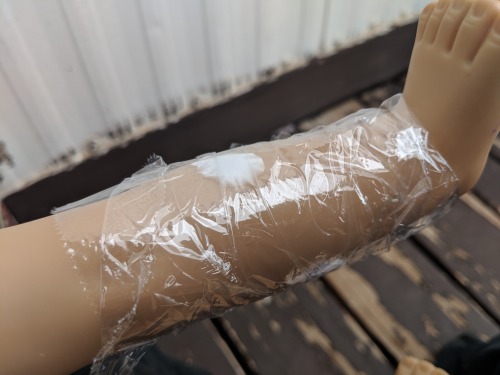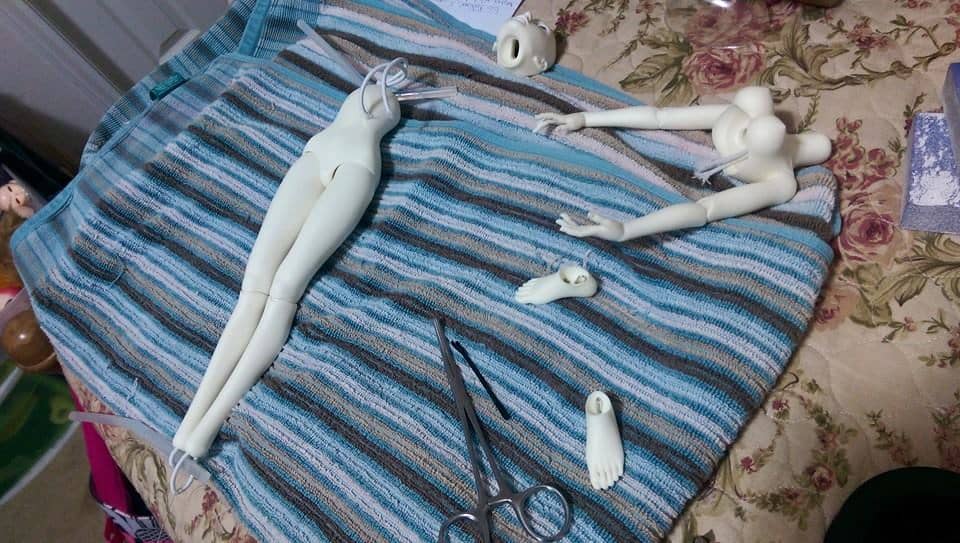How do you get stains out of a sex doll?
Sep 25,2023 | colin
To remove stains from a sex doll, use mild soap, warm water, and gentle rubbing, avoiding harsh chemicals.

Types of Stains
Organic Stains
Organic stains primarily come from living organisms. For sex dolls, these could be:
Bodily Fluids: These are inevitable, especially when using the doll for its intended purpose.
Sweat: A natural secretion that can leave salt and residue.
Saliva: Though it seems harmless, it can leave behind subtle marks, especially if the doll is not cleaned promptly.
Blood: Whether from minor injuries or menstrual cycles, blood can be particularly challenging to remove if not addressed immediately.
Other bodily secretions: Without prompt cleaning, they can lead to stains or even bacterial growth.
Inorganic Stains
These are stains that come from sources not derived from living organisms.
Ink: Ballpoint, fountain, or other types of ink can accidentally stain a doll. For instance, if the doll comes in contact with a pen.
Tattoos and Markers: Some owners might want to give their dolls tattoos or marks, but these can also lead to inadvertent stains.
Dyes: This could be from clothing, wigs, or any colored fabric that has the potential to transfer its color onto the doll's surface.
Colored Fabrics: New or non-colorfast clothing can bleed colors, especially when wet.
Hair Dyes: If a doll's wig or hair gets dyed, there's potential for staining.
Chemical Stains
Sometimes chemicals, whether intended for use on the doll or accidentally applied, can lead to staining.
- Lubricants: Essential for many users, but they can sometimes leave residue or discoloration.
- Water-based: Generally easier to clean and less likely to stain.
- Silicone-based: Might interact with some doll materials, leading to potential staining.
- Cosmetics: Applying makeup can enhance a doll's appearance, but it can also lead to stains.
- Lipstick and Lip Gloss: These can leave marks, especially darker shades.
- Foundation and Powders: If not used carefully, these can leave a residue.
- Eyeshadows and Mascaras: These need caution, especially around the doll's eyes, to prevent staining.
General Guidelines for Cleaning
Importance of Gentle Cleaning
When cleaning a sex doll, it's crucial to approach the task with gentleness and care. Here's why:
- Preserving Material Integrity: Harsh cleaning can degrade the doll's material over time, leading to discoloration or surface damage.
- Maintaining Lifelike Appearance: Gentle cleaning ensures that the doll retains its lifelike appearance without causing undue wear or tear.
- Preventing Tears and Scratches: Using soft cloths and avoiding abrasive materials will prevent unintentional damage.
- Longevity: Gentle cleaning practices can significantly extend the lifespan of the doll, making it a worthwhile investment for owners.
Materials to Avoid
Certain cleaning materials can do more harm than good. Here are some to steer clear of:
Alcohol and Acetone: These can cause severe damage, especially to silicone-based dolls.
Bleach: While it's a powerful disinfectant, bleach can discolor or damage the material of the doll.
Abrasive Scrubbers: Brushes with hard bristles or rough scrubbing pads can leave scratch marks.
Harsh Chemical Cleaners: Some household cleaners are not suitable for delicate materials like those used in dolls.
Safety Precautions
When cleaning a sex doll, personal safety and the doll's care should go hand in hand. Consider the following:
Wear Gloves: Protect your skin from both the dirt and any cleaning products being used.
Ventilate the Area: If using any liquid cleaners, ensure the room is well-ventilated to avoid inhaling fumes.
Read Labels: Always read the labels of any cleaning products to ensure they're safe for the doll's material.
Test in a Small Area: Before applying any product, test it in an inconspicuous spot to check for any adverse reactions.
Keep Away from Children: Ensure that the cleaning session is conducted away from the curious eyes of minors.
Step-by-step Stain Removal
Identifying the Type of Stain
Before you start the removal process, it's essential to identify the type of stain. This will determine the cleaning method and solutions to use.
- Organic Stains: Originating from living organisms, like sweat, saliva, or blood.
- Inorganic Stains: Stains like ink or dyes from clothing.
- Chemical Stains: These can arise from lubricants or cosmetics.
By identifying the stain type, you can tailor your cleaning approach for optimal results.
Pre-cleaning and Surface Assessment
Before diving into the cleaning process, some initial steps help ensure effective stain removal:
- Dust off any loose dirt or debris from the doll's surface.
- Assess the size and severity of the stain. Larger or older stains might require more intensive cleaning.
- Consult the manufacturer's guidelines. This provides insights into which products or techniques work best for the doll's specific material.
- Prepare the cleaning area: Ensure you have adequate lighting, and gather all necessary cleaning supplies in advance.
Applying Cleaning Solutions
Now that you're ready to tackle the stain, here's how to proceed:
- Opt for a mild detergent or a cleaning solution specifically designed for sex dolls. Avoid harsh chemicals.
- Apply a small amount of the solution to a soft cloth. Do not pour or spray directly onto the stain.
- Gently rub the stain in a circular motion, starting from the outside and moving inward to prevent spreading.
- Reapply the solution as needed, but avoid oversaturating the area.

Rinsing and Drying
Post-cleaning, it's essential to remove any residue and properly dry the doll.
- Rinse the cleaned area with lukewarm water. Avoid using hot water as it might warp or damage the material.
- Pat dry with a soft, lint-free cloth. Do not rub aggressively as it can cause abrasion.
- Allow the doll to air dry in a well-ventilated area. Avoid direct sunlight or heat sources, which could lead to material degradation or discoloration.
Specialized Cleaning Techniques
For Silicone Dolls
Silicone is a popular material for sex dolls due to its lifelike feel and durability. However, it requires specialized care.
Use a mild soap or detergent. Silicone can withstand a variety of cleaning agents, but it's always safer to opt for gentler options.
Avoid products containing alcohol or acetone. These can degrade the silicone over time.
If the silicone has a matte finish, you might notice it becoming shiny over time. To restore the matte appearance, consider using a renewal powder specifically designed for silicone dolls.
To remove stains from silicone, isopropyl alcohol can be effective. Always test on a small, inconspicuous area first.
For TPE (Thermoplastic Elastomer) Dolls
TPE is another common material for sex dolls. It's softer than silicone and can feel more lifelike, but it's also more porous, making it susceptible to staining.
- Always use a mild, non-abrasive soap. TPE is sensitive, and aggressive cleaning agents can cause damage.
- For stubborn stains on TPE, consider using a homemade mixture of baking soda and water to form a paste. Apply this gently to the stain and let it sit for a short period before rinsing.
- After cleaning, consider using a TPE renewal powder to maintain the skin's soft, non-tacky feel.
- Mineral oil can help restore the softness of TPE after cleaning, but use sparingly and infrequently.
For Fabric or Plush Dolls
Fabric dolls have a unique set of challenges, as they can't be cleaned in the same way as silicone or TPE dolls.
- Vacuum gently with a brush attachment to remove dust and surface debris.
- For light stains, use a cloth dampened with a mild detergent solution. Gently dab the stained area without rubbing, as this can spread the stain or damage the fabric.
- If the fabric doll has a removable cover, consider machine washing it on a delicate cycle with cold water. Always check care labels first.
- Air dry fabric dolls. Avoid using a tumble dryer as the heat can cause shrinkage or damage to the material.

Restoration and Maintenance
Reviving the Doll's Skin Texture
Over time and with repeated use, a doll's skin may lose its original texture. Here are ways to rejuvenate it:
- Use specialized renewal powders designed for the doll's specific material, be it silicone or TPE. This helps to retain the soft, skin-like texture and prevent tackiness.
- Lightly exfoliate the doll's skin using a soft brush. This helps remove dead skin particles or accumulated dirt, restoring the original texture.
- For silicone dolls, consider moisturizing with a light, silicone-compatible lotion. For TPE dolls, mineral oil can be used sparingly to maintain softness.
Proper Storage Techniques
How you store the doll can greatly influence its longevity and appearance over time.
Store the doll in a cool, dry place, away from direct sunlight to prevent color fading and material degradation.
Avoid folding or bending the doll into unnatural positions. This can cause creases or stress points on the material.
Use a soft fabric or sheet to wrap the doll, preventing dust accumulation.
If possible, store the doll horizontally on a flat surface to distribute its weight evenly and prevent deformation.
Maintaining Hygiene
Maintaining the doll's hygiene is crucial for both the user's health and the doll's longevity.
Clean the doll after each use, focusing on orifices and areas that come into contact with the body.
Consider using anti-bacterial sprays or wipes designed for intimate toys. This ensures the doll remains sanitary and free of harmful microbes.
Allow the doll to air dry thoroughly after cleaning. Trapped moisture can lead to mold or bacterial growth.
For dolls with removable parts (like inserts), clean these separately to ensure a thorough cleaning, and let them dry before reassembling.






